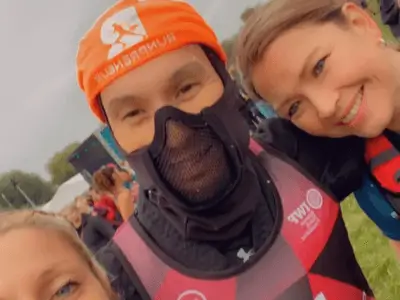Runpreneur Journey Blog
Embark on an extraordinary journey with the Runpreneur community. Discover inspiring stories, insider tips, and the transformative power of our global challenge. From first-time runners to seasoned athletes, our blog captures the essence of the Runpreneur movement, inspiring others to join the cause.

Overwhelming Your Team: Recognizing the Signs and Taking Action
Overwhelming Your Team:
Recognizing the Signs and Taking Action
In today's world, managing a team effectively can be a daunting task. It's so easy to unknowingly place too much pressure on team members, leading to stress and burnout. As I reflect on consecutive day 1569 of my journey, I want to share some insights on overwhelming your team members, the signs to look out for, and the steps you can take to address it before it causes lasting damage.
The Importance of Stress Management
Stress is often referred to as the silent killer, and for good reason. It has profound implications for our overall health. When stress becomes chronic and unmanaged, it can lead to serious health issues, including heart disease. Just like how our bodies are pushed under controlled duress during exercise, unexpected duress from overwhelming responsibilities can take a toll on our well-being.
Recognizing the Signs of Overwhelm
Recently, a senior member of my team reached out, asking to skip our weekly leadership meeting. This meeting is fundamental to discussing strategy and moving forward with our plans. The message from this individual was clear—they were feeling overwhelmed and needed a day to regroup. This was a significant indicator for me. When one of your team members feels the need to step back, it’s a sign that they are nearing their breaking point.
Taking Ownership and Action
When I realized the extent of the stress I had inadvertently placed upon this team member, I took it very personally. It's my responsibility to ensure that my team can handle their workload without feeling overburdened. I immediately held a meeting with our group MD to devise a contingency plan to alleviate some of the pressure from this individual.
The Importance of Training and Delegation
One of the lessons learned from this experience is the vital role of proper training and delegation. While I had encouraged this team member to upskill their assistants, the sheer volume of high-priority tasks had left them with too much to handle. Going forward, we’ve broken down their role into key categories, identifying which responsibilities can be transferred to others to create a more balanced workload.
Involvement and Empowerment
It’s crucial to involve the person in question when making these changes. This ensures they are part of the solution and can learn from the process. If they ever find themselves in a similar situation in the future, they’ll know how to address it proactively. By doing this, we can empower our team members rather than just delegating more work to them.
Skill Assessment and Role Alignment
Through this process, we discovered that some components of the overwhelmed team member's role didn’t align with their skills. By reallocating these tasks to individuals who are more suited to them, we not only relieve stress but also increase efficiency and productivity. Understanding the skills and capabilities of your team is essential for proper role alignment.
Moving Forward
I'd like to believe we’ve nipped this issue in the bud and that it won’t recur, but realistically, team dynamics are ever-changing, and challenges will arise. The key takeaway for me is to remain vigilant and responsive to the signs of stress and overwhelm within my team. By doing so, we can maintain a healthy and productive work environment.
In summary, recognizing and addressing the signs of overwhelming your team is pivotal for any leader. Ensuring that responsibilities are balanced and that your team members are supported can make a significant difference in their well-being and performance. It's a continuous learning process, and I am committed to adjusting and improving our approach as needed.
Thank you for taking the time to read my reflections. If you have any questions or comments, feel free to drop me a line—I respond to everyone. If you believe in my mission of saving the lives of children by attempting the ultimate ultra-marathon of run vlogging on consecutive days, covering the distance around the world barefoot, then do give this a subscribe, share, like, and comment. The more people we reach, the more money we raise, and the more children's lives we save. Stay positive, stay happy.
Best regards,
Kevin Brittain

Kevin's 40,075km Challenge: Raising £1 Million for Children
Meet Kevin, a dedicated Runpreneur who embarked on an extraordinary journey to raise £1 million for children in need. Over the course of his 40,075km challenge, Kevin's unwavering determination and passion inspired thousands to join the Runpreneur movement.

Runpreneur Vlogging: Capturing Kevin's Journey
Experience the Runpreneur challenge through the lens of Kevin's video diary. Witness his ups and downs, the camaraderie of the community, and the transformative power of running for a cause. Dive into the visual stories that capture the essence of the Runpreneur movement.

Empowering Children, One Step at a Time
As Kevin logged every kilometre of his 40,075km challenge, the true purpose behind his journey came into focus. Each step, each bead of sweat, fuelled essential healthcare, education, and nutrition programs for children in need around the world.

The Transformative 4x4x48 Challenge
Experience the thrill and personal growth of our iconic 48-hour running event. Witness the determination and resilience of Runpreneurs as they push their limits, one mile at a time.

Runpreneur Vlogging: Capturing the Journey
Dive into the visual stories of our Runpreneurs as they document their experiences through engaging video logs. Witness the challenges, triumphs, and moments of camaraderie that define the Runpreneur spirit.





















